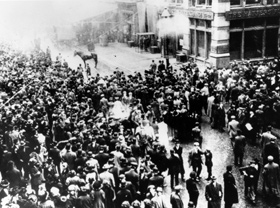Nightmare of Survival
By Leon Stein
The immediate impact of the tragedy was felt in East Side homes. The following, based on personal interviews, is taken from The Triangle Fire, by Leon Stein, the editor emeritus of Justice, 1962.
Rose Cohen [having escaped the fire and made her way home] sobbed herself to sleep on her bed in the dark bedroom of a long railroad flat on Lewis Street. No one was home when she arrived.
In her sleep she heard shouting and opened her eyes to the darkness. Down the long line of rooms, in the kitchen, her cousin Harry was shouting and crying. He had made the rounds, looking for Rose and had been unable to find her. He feared the worst had happened.
"My mother asked him what had happened. He began to tell her about the fire. I got up from the bed and began the long walk to the kitchen, passing through one room after another as in a dream. Finally, I stood in the kitchen doorway, supporting myself by holding onto the door frame. Then everything broke apart. My mother took one look at me and collapsed to the floor. I began to cry and scream hysterically.
"I couldn't stop crying for hours, for days," says Rose. "Afterwards, I used to dream I was falling from a window, screaming. I remember I would holler to my mother in the dark, waking everybody up, 'Mama! I just jumped out of a window!' Then I would start crying and I couldn't stop."
See documents: My First Job by Rose Cohen.
Isidore Wegodner escaped down the Greene Street stairs from the ninth floor, where he and his father had come to work four months earlier as sleeve setters. He was near that exit when he heard the first cry of fire and had no difficulty reaching the street.
But unaware of the extent of the disaster, he had left his father behind. Only when he emerged into the body-littered street did he realize what was happening. The firemen stopped him when he tried to rush back into the building.
They wouldn't even let him cross the street to look among the dead, and he began to cry softly, certain his father lay among them. He moved away, looking into other faces and asking for his father. He spoke only Yiddish, therefore only dimly perceived that there was something called a morgue to which the dead were to be taken.
Suddenly his young heart was lifted by the thought that perhaps his father was seeking him even as he was searching for the old man and that not having found him he had gone home in the expectation of finding him there.
Isidore ran to the Third Avenue elevated, then ran all the way from the 116th Street station to his sixth-floor home on 119th Street. His father was not there, and when he turned to go down to the street, he lied to his unknowing mother, telling her he had forgotten to buy the old man his newspaper.
In the street, he ran again, determined to return to Washington Place and to find out where this thing called a morgue was located. He missed a train by seconds and stood on the platform breathing hard, watching another pull in on the opposite platform.
"I saw him come out of the train, my dear father who was a quiet man, a dignified man. He looked battered. His pants were torn and in places his flesh showed through. His hat was gone, his face was dirty and bloody. On top of it all he wore a fancy, clean jacket that someone had thrown around his shoulders because his shirt had been ripped off. He stood on the platform dazed and the people walked around him.
"I remember," says Isidore Wegodner, "how with my last strength I shouted to him, how I went tearing over the little bridge that connected the two platforms, how we fell into each other's arms and how the people stopped to look while sobbing he embraced me and kissed me."
Leon Stein, ed., Out of the Sweatshop: The Struggle for Industrial Democracy (New York: Quadrangle/New Times Book Company, 1977), pp. 193-194
The Kheel Center would like to thank Mrs. Miriam Stein and Barbara Ismail for granting permission to use selections from the late Leon Stein's book.

